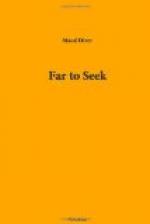Her feigned surprise was delicately done. “What a shame! Who’s been snubbing you? Our clever M.B.?”
“Not at all. You’ve got the initials wrong.”
“Did it hurt your feelings—as much as all that?” She dropped the flimsy pretence and her eyes proffered apology.
“Well—you invited me.”
“And mother invited Mr Hayes! The fact is—he’s been rather in evidence these few days. And one can’t flick him off like an ordinary mortal. He’s a ’coming man’!” She folded hands and lips and looked deliciously demure. “All the same—it was unkind. You were so unhappy at dinner. I could feel it all that way off. Be magnanimous and come for a ride to-morrow—do.”
And Roy—the detached, the disillusioned—accepted with alacrity.
FOOTNOTES:
[Footnote 19: Washerman.]
[Footnote 20: Dusters.]
[Footnote 21: Gardener.]
[Footnote 22: Bad characters.]
CHAPTER IV.
“For every power,
a man pays toll in a corresponding weakness; and
probably the artist
pays heaviest of all.”—M.P. WILLCOCKS.
It was the morning of the great Gymkhana, to be followed by the Bachelors’ Ball. For Lahore’s unfailing social energy was not yet spent; though Depot troops had gone to the Hills, and the leave season was open, releasing a fortunate few; leaving the rest to fretful or stoical endurance of the stealthy, stoking-up process of a Punjab hot-weather. And the true inwardness of those three words must be burned into body and brain, season after season, to be even remotely understood.
Already earth and air were full of whispered warnings. Roses and sweet-peas were fading. Social life was virtually suspended between twelve and two, the ‘calling hours’ of the cold weather; and at sunset the tree-crickets shrilled louder than ever—careless heralds of doom. Human tempers were shorter; and even the night did not now bring unfailing relief.
Roy had been sleeping badly again; partly the heat, partly the clash of sensations within him. This morning, after hours of tossing and dozing and dreaming—not the right kind of dreams at all,—he was up and out before sunrise, forsaking the bed that betrayed him for the saddle that never failed to bring a measure of respite from the fever of body and mind that was stultifying, insidiously, his reason and his will.
Still immersed in his novel, he had come up to Lahore heart-free, purpose-free; vaguely aware that virtue had gone out of him; looking forward to a few weeks of careless enjoyment, between spells of work; and above all, to the ‘high old time’ he and Lance would have together beyond Kashmir. Women and marriage were simply not in the picture. His attitude to that inevitable event was, on his own confession—’not yet.’ Possibly, when he got Home, he might




